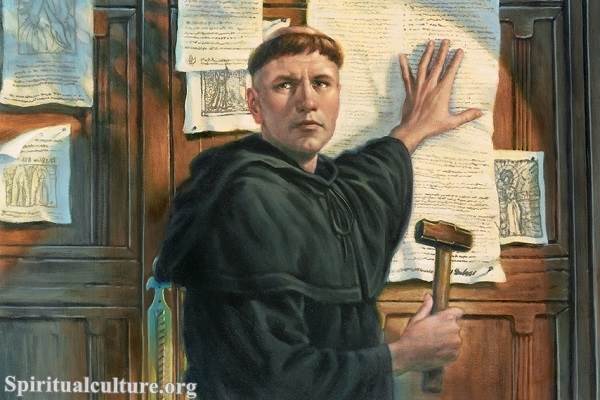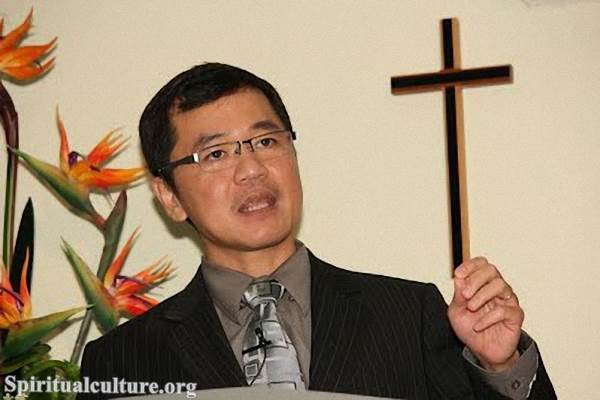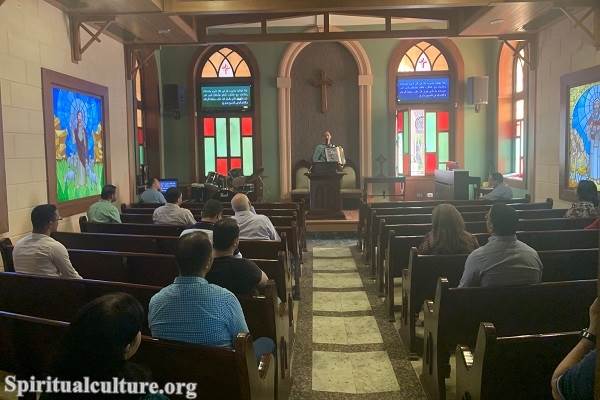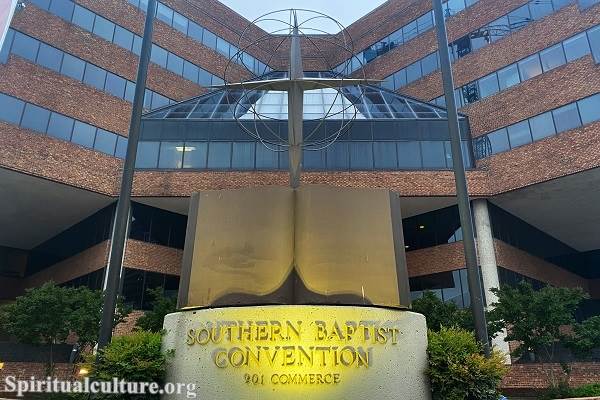These two branches have a long and complicated history, with many differences.
The main differences between Protestants and Catholics
One of the main differences between Protestants and Catholics is their beliefs about the church’s authority. Protestants generally believe in the priesthood of all believers, which means that all believers have direct access to God through their faith and do not need the intermediation of a priest or bishop. On the other hand, Catholics believe in the authority of the church and the pope and believe that sacraments (such as baptism and Communion) are necessary for salvation.
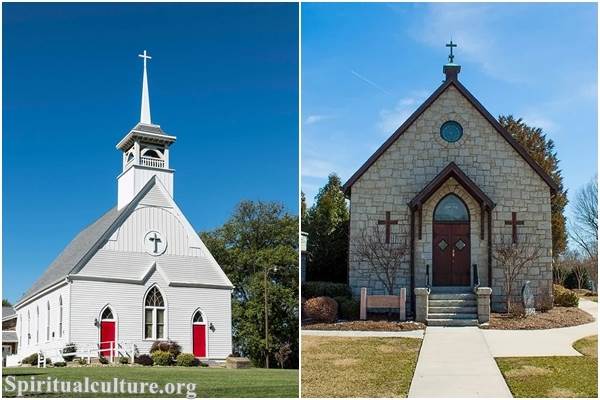
There are also differences in beliefs about the Bible. Protestants generally believe that the Bible is the ultimate authority on faith and practice and often interpret it literally. On the other hand, Catholics believe that the Bible is an important source of revelation but also emphasize tradition and the church’s teachings.
Other differences between Protestants and Catholics include their beliefs about salvation, the nature of Christ, and the role of Mary, the mother of Jesus. Despite these differences, both Protestants and Catholics believe in the same God and follow Jesus Christ as their savior.
Specific differences between Protestant and Catholic
There are many differences between Protestants and Catholics, and some are quite significant. Here are a few more examples:
- Worship and liturgy: Protestants and Catholics have different approaches to worship and liturgy. Protestants tend to have more formal, structured services, while Catholics have more traditional, ritualized liturgies. Protestants also emphasize preaching and reading the Bible, while Catholics emphasize the Mass and the sacraments.
- Sacraments: Protestants and Catholics have different beliefs about the sacraments, which are special ceremonies that are believed to convey grace, or the favor of God, to believers. Protestants generally recognize only two sacraments: baptism and Communion. On the other hand, Catholics recognize seven sacraments: baptism, Communion, confirmation, reconciliation (also known as confession), marriage, holy orders (ordination as a priest), and anointing of the sick.
- Salvation: Protestants and Catholics have different beliefs about how people can be saved or reconciled with God. Protestants generally believe that salvation is obtained through faith in Jesus Christ alone, while Catholics believe that salvation comes through faith in Jesus Christ and good works and the sacraments.
- Authority: Protestants and Catholics have different beliefs about the church’s authority. Protestants believe that the Bible is the ultimate authority on matters of faith and practice, and they reject the idea of earthly authority, such as the pope, having ultimate authority over their beliefs and practices. On the other hand, Catholics believe in the church’s authority and the pope’s authority, and they believe that the pope has a special role as the head of the church on earth.
- Mary: Protestants and Catholics have different beliefs about the role of Mary, the mother of Jesus. Protestants generally do not place a great emphasis on Mary, and they do not believe that she was sinless or that she was bodily assumed into heaven. On the other hand, Catholics believe that Mary was sinless and that she was bodily assumed into heaven, and they often pray to her and seek her intercession.
- Purgatory: Catholics believe in purgatory, a place or state of purification where the souls of believers go after death to expiate any remaining sins before they can enter heaven. Protestants generally do not believe in purgatory and believe that believers go directly to heaven or hell after death.
- Indulgences: Catholics believe in indulgences, which are acts of penance or good works that reduce the time a person’s soul must spend in purgatory. Protestants generally reject the idea of indulgences and instead believe that salvation is obtained through faith in Jesus Christ alone.
- Clergy: Protestants and Catholics have different beliefs about the clergy or ordained leaders of the church. Protestants generally believe in the priesthood of all believers, which means that all believers have direct access to God through their faith and do not need the intermediation of a priest or bishop. On the other hand, Catholics believe in the authority of the clergy, and the pope and that ordained priests can only administer the sacraments.
- The Eucharist: Protestants and Catholics have different beliefs about the Eucharist, a Christian rite commemorating the Last Supper of Jesus Christ. Protestants generally believe that the Eucharist is a symbolic representation of the body and blood of Jesus, while Catholics believe that the bread and wine used in the Eucharist are transubstantiated or changed into the actual body and blood of Jesus.
- Iconography: Protestants and Catholics have different beliefs about using icons, or religious images, in worship. Protestants reject the use of icons, seeing them as a form of idolatry, while Catholics believe that icons can be helpful in teaching and reminding believers about the faith.
- Clergy celibacy: Protestants and Catholics have different beliefs about their clergy’s celibacy or abstention from marriage. Protestant clergy is generally allowed to marry, while Catholic clergy is required to be celibate.
- Birth control: Protestants and Catholics have different beliefs about using birth control. Protestants generally believe that birth control is a matter of personal conscience and that couples can use it if they wish. On the other hand, Catholics traditionally have opposed the use of birth control, although Pope Francis has recently indicated a more open stance on the issue.
- Abortion: Protestants and Catholics have different beliefs about the moral status of abortion. Protestants generally believe that life begins at conception and that abortion is morally wrong, while Catholics believe that abortion is always wrong, with a few exceptions, such as in cases of rape, incest, or to save the mother’s life.
- Homosexuality: Protestants and Catholics have different beliefs about the moral status of homosexuality. Protestants are generally divided on the issue, with some denominations accepting homosexuality and same-sex marriage and others rejecting them. Catholics traditionally have opposed homosexuality and same-sex marriage, although Pope Francis has recently indicated a more open stance on the issue.
- Baptism: Protestants and Catholics have different beliefs about the nature and purpose of baptism. Protestants generally believe that baptism is a symbol of the believer’s union with Christ and a sign of their new life in him, while Catholics believe that baptism is a sacrament that cleanses the person of original sin and makes them a member of the church. Protestants generally practice infant baptism, while Catholics also practice infant baptism, but they also have a rite of baptism for adults.
- Communion: Protestants and Catholics have different beliefs about Communion’s nature and purpose, also known as the Eucharist. Protestants generally believe that Communion is a symbolic representation of the body and blood of Jesus, while Catholics believe that the bread and wine used in Communion are transubstantiated, or changed, into the actual body and blood of Jesus. Protestants generally allow all believers to receive Communion, while Catholics generally only allow Catholics who are in a state of grace to receive Communion.
- The role of women in the church: Protestants and Catholics have different beliefs about the role of women in the church. Protestants generally believe that women can serve in any role in the church, including as pastors and bishops, while Catholics traditionally have only allowed men to be ordained as priests and bishops. However, the Catholic Church has recently begun to consider ordaining women as deacons, which is a lower level of ordination.
- Church structure: Protestants and Catholics have different structures for their churches. Protestants generally have a more decentralized structure, with each church being autonomous and responsible for its affairs. On the other hand, Catholics have a more centralized structure, with the pope at the head of the worldwide church and bishops and priests serving under him.
- The role of tradition: Protestants and Catholics have different attitudes towards tradition. Protestants generally emphasize the authority of the Bible and interpret it literally, while Catholics emphasize tradition and the church’s teachings. Protestants often reject certain traditions, such as the use of icons, as being unbiblical, while Catholics see tradition as an important part of the faith and view the church’s teachings as being passed down from the apostles.
- The role of reason: Protestants and Catholics have different attitudes towards the role of reason in the faith. Protestants generally emphasize the use of reason and individual interpretation of the Bible, while Catholics emphasize tradition and the church’s authority. Protestants often see the use of reason as a way to arrive at truth, while Catholics see reason as being in harmony with faith.
- The role of emotion: Protestants and Catholics have different attitudes towards the role of emotion in the faith. Protestants generally place a greater emphasis on the emotional aspect of faith, such as the experience of personal conversion, while Catholics place a greater emphasis on the rational and intellectual aspects of faith. Protestants often see emotion as an important part of the faith experience, while Catholics see emotion as being in harmony with reason.
- The role of social justice: Protestants and Catholics have different attitudes towards the role of social justice in the faith. Protestants generally see social justice as an important part of the faith and place a strong emphasis on issues such as poverty, racism, and peace, while Catholics see social justice as being a natural expression of the faith and place a strong emphasis on issues such as the dignity of the human person and the common good.
Despite these differences, both Protestants and Catholics follow Jesus Christ as their savior and believe in the same God. Both branches of Christianity have a long and rich history and have made significant contributions to the world.

